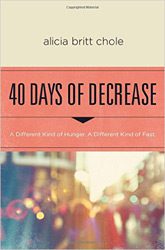 Lent is a partisan animal. How much we pay attention to it largely depends on where we come down in the Body of Christ called the Church. Liturgical churches observing the annual church calendar all went for ashes on their foreheads a few weeks ago. Baptist, evangelical, charismatic, Pentecostal, non-denominational, etc mostly ignore it or do something else. Here in Detroit, with a significant Polish population, our choice is to pound down paczkis (poonch-keys) on Fat Tuesday. They’re a filled, heavily sugared, donut. The ones filled with Italian cannoli cream are the best. The Polish/Italian thing lets us use “diversity” as a rational to wolf down a few of these and to spend the rest of the day dragging around in sugar comas. So begins Lent for some of us in the Body of Christ.
Lent is a partisan animal. How much we pay attention to it largely depends on where we come down in the Body of Christ called the Church. Liturgical churches observing the annual church calendar all went for ashes on their foreheads a few weeks ago. Baptist, evangelical, charismatic, Pentecostal, non-denominational, etc mostly ignore it or do something else. Here in Detroit, with a significant Polish population, our choice is to pound down paczkis (poonch-keys) on Fat Tuesday. They’re a filled, heavily sugared, donut. The ones filled with Italian cannoli cream are the best. The Polish/Italian thing lets us use “diversity” as a rational to wolf down a few of these and to spend the rest of the day dragging around in sugar comas. So begins Lent for some of us in the Body of Christ.
Any ritual can melt down into meaningless rote observance. Speaking as an outsider, I hear people giving up this or that. Why? And if we give up something, what is the virtue of sheer deprivation of what might seem trivial? If we give it up, why take it up again after forty days? Just leave it alone. I’ve fasted from chicken livers for 365 days a year for years and it’s done me no perceivable good. Alicia Britt Chole had me in mind as well many faithful practitioners of the forty day period leading up to Easter known as Lent when she wrote her new book, 40 Days of Decrease.
Alicia has done something wise even in the design of the cover. Publishing people sweat over book covers a lot. Book covers sell the book to readers. ‘Tis the season for Lenten devotionals, almost all of which have “Lent” or “Lenten” somewhere in the subtitle. And when they do, they’re singing to the choir. And the liturgical churches practicing Lent are worth singing to. But the full title of this one reads 40 Days of Decrease: A Different Kind of Hunger. A Different Kind of Fast. The title pricks the curiosity of those non-Lenten practitioners of us who still take God and knowing him quite seriously. And she sneaks up on those for whom Lent can be a flat routine and pokes them with a number of challenges.
Alicia Britt Chole writes well. That means more than making adverbs roll over like a dog performing for a biscuit. She makes the reader enjoy the read in a way that draws them quickly and engagingly from sentence to sentence. She clearly loves the beauty of words but not it a way that overrides with attention to herself or distraction from the meaning. She shares out of her life. “Little did I know that the pain was under assignment; it was making room in my life for another operation well beyond the reach of any surgeon’s scalpel. I would not trade that desert of pain for anything in the world.” Anybody here want to know more?
If Alicia writes well, it’s because she reads widely and thinks well. All good writing comes from this. A quick scan of her quotes covers more than two thousand years of biblical history, most corners of the Body of Christ and writers both scholarly and popular. She thinks well and it shows in the way she deals with Scripture in each entry as things move toward Good Friday and Easter. When hockey coaches train their teams, they do a drill using an egg. To teach passing, they have their players pass an egg back and forth on the ice without breaking it. This teaches players to have “softer” hands, to pass and take passes with control. Alicia has “soft hands” on the biblical texts of the forty sessions. She nuances meaning from them that many will find new or wondering why they haven’t seen them before (one mark of good teaching). While she has a few degrees, this isn’t about dazzling us about what she knows that we don’t.
The format of the daily meditations differs from probably any Lenten devotional or book we may have read. Often there’s just a short reading under the head of a Scripture verse followed by a brief, generic sounding prayer. It’s hit-or-miss, “it has okay lyrics but a nice beat to dance to” kind of feel. But Alicia practices spiritual direction and understands that the path to God isn’t the same for everyone. Each day packs different approaches into a daily box. She begins with a meditation on the biblical text. This often includes sidebar illustrative quotes from many different sources. Next comes the reflection which doesn’t dictate to the reader what they should have gotten out of the text but always has thoughtful points. Next comes the best feature of the book. Alicia suggests a different fast for every day and none of her suggestions are the kinds of things most people choose for themselves. Have we ever fasted for even a second from regrets, tidy faith, fixing, stinginess, discontentment, formulas or apathy? And that leaves thirty-three more. Finally, most days conclude with space for journaling the day’s thoughts.
The pages hold whiffs of serious theology. Many chapters end with references to early church fathers and others because she wishes to show that the spiritual/theological significance of Lent goes back to the earliest church. This is primal stuff and not just a scheme of churchmen in the Middle Ages to get moderns to give up chocolate. She holds on to the 40 day wilderness motif of Jesus’ temptations as a valid and essential frame for entering lent; wildernesses of all kinds are often God’s choicest classrooms. Finally, the reader will encounter various forms of the word “decrease” throughout the book. John the Baptist’s words, “He must increase, but I must decrease,” (John 3:30) seem to be the template Alicia lays across every text and thought. She will jog the reader’s thinking in many ways.
Alicia Britt Chole didn’t put the word “Lent” on the cover. One reason might be that 40 Days of Decrease isn’t just for Lent. It’s not even just for people who get Lent. I suppose one could eat a paczki or two while working through it (remember those cannoli cream filled ones!). 40 Days of Decrease is really for anyone willing to push through to a different kind of hunger, a different kind of fasting, any time of the calendar year.
Read an excerpt from 40 Days of Decrease at the Patheos Book Club here.












